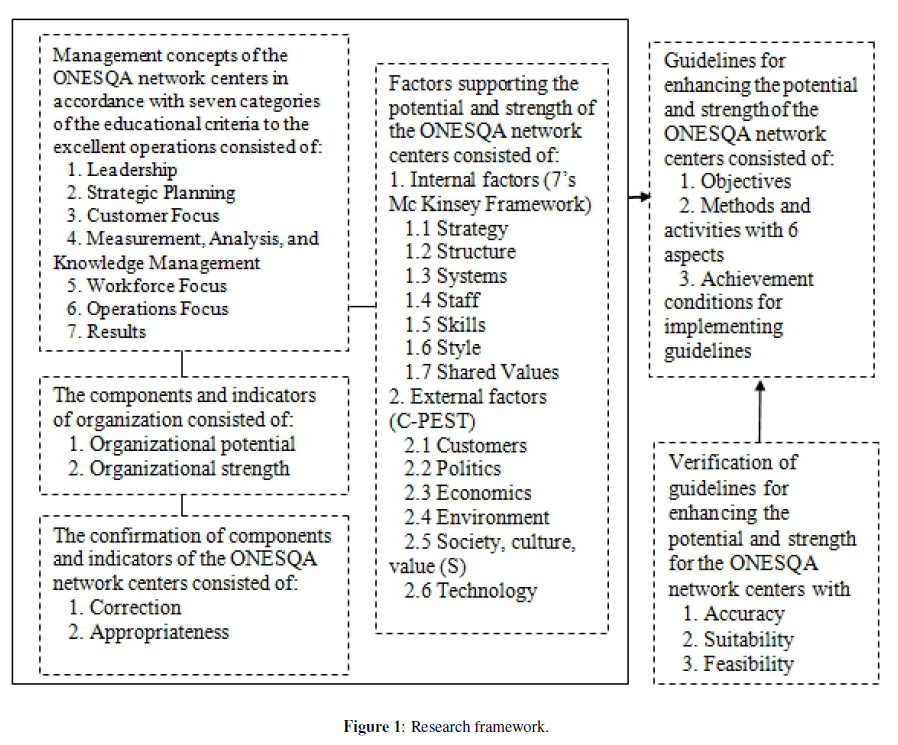Guidelines for enhancing potential and strength to the ONESQA network centers
Main Article Content
Abstract
Four objectives of this research were to: 1) synthesize the components and indicators; 2) investigate the factors supporting the potential and strength; 3) formulate guidelines; and 4) verify guidelines for enhancing potential and strength for the ONESQA network centers. The key informants consisted of administrative committee of the ONESQA network centers, relevant agencies, and school administrators as service receipt agencies. Instruments used were an online focus group discussion, an online workshop, a synthesis form, a questionnaire, and a verification form. Data were analyzed by frequency, percentage, mean, standard deviation, content analysis, and inductive summary. The research results were as follows: 1) components and indicators of the ONESQA network centers with potential and strength consisted of 7 components with 52 indicators and the confirmative results of correction and appropriateness were overall at the highest level; 2) the factors supporting the potential and strength for the ONESQA network centers were overall both internal and external at the highest level; 3) the guidelines for enhancing potential and strength for the ONESQA network centers consisted of 3.1) objectives, 3.2) methods and activities for enhancing divided by the organization's excellent processes into 6 aspects, and 3.3) achievement conditions for implementing guidelines; and 4) the verification results for accuracy, suitability, and feasibility were overall at a high level in all aspects.
Article Details
References
Office of the Council of State, Constitution of the Kingdom of Thailand B.E. 2550 (A.D. 2007). http://web.krisdika.go.th/data/outsitedata/outsite21/file/Constitution_of_the_Kingdom_of_Thailand.pdf (accessed 9 February 2020).
The Office for National Education Standards and Quality Assessment (Public Organization) (ONESQA). Memorandum of Understanding for the Development of Educational Quality Assurance between Office of Education Standards and Quality Assessment (Public Organization) with Chiang Mai University on September 13, 2019, No. P.S.S. 6/2562. Document No. M.S. 0004/3301, Date. 17 September 2019
D. Chamas, S. Meechan, T. Tungprapa, Quality assurance management model for world – class standard excellence, Journal of Humanities and Social Sciences, Nakhon Phanom University 10(3) (2020) 1 – 11.
National Institute of Standards and Technology (NIST). Education criteria for performance excellence, http://www.qa.kmutnb.ac.th/upload_files/bookorther/baldrige_education_criteria_2013-2014.pdf (accessed 9 February 2020).
McKinsey and Company. 7’s McKinsey framework https://www.mckinsey.com/business-functions/strategy-and-corporate-finance/our-insights/enduring-ideas-the–7–s-framework
P. Phubet, P. Choocheep, A model of work-integrated learning to prepare educational administrators for Thailand, Interdisciplinary Research Review 15(3) (2020) 7 – 13.
P. Na Chiangmai, Y. Yaboonthong, C. Puthaprasert, P. Rupavijetra, Administration model of civil state schools to improve the quality of education, Interdisciplinary Research Review, 15(5) (2020) 16 - 23.
M. Srisapan, C. Puthaprasert, Y. Yaboonthong, P. Rupavijetra, The model of integrated learning management to develop learning in the 21st century for students of Northeast Sports School, Interdisciplinary Research Review 15(5) (2020) 46 – 54.
R. Narumon, S. Thanarat, Development of academic network administration guidelines for educational quality development for schools under the office of Roi Et Primary Education Service Area Office 1, Academic Journal of Mahamakut Buddhist University Roi Et Campus 9(1) (2020) 271 – 282.


